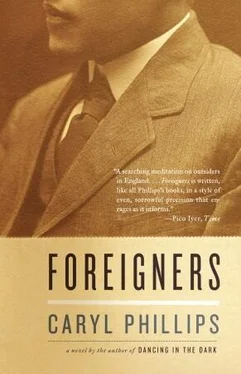On his arrival home, Randolph Turpin was greeted by scores of reporters who wanted to know the full story of what had transpired but, at least initially, Turpin was reluctant to speak with them. News had already reached the pressmen that Turpin had been temporarily banned by the New York State Athletic Commission from fighting in the United States, and this seemed to represent a serious professional blow, but when Turpin eventually spoke he was keen to play down the gravity of the situation. He confessed to being shocked by Miss Daniels' charges, for she appeared to him to be a quiet and friendly girl, but he admitted that he had met her before the Sugar Ray Robinson fight in New York, and confirmed that over the past two years they had written to each other. He went on: 'We certainly did discuss marriage but when I came out to the United States the last time I told her it was over. I said, "Forget about me."' But Turpin could not keep his story straight. Sometimes he claimed that she had wanted to come back to England with him, and that's why she brought the charge. On other occasions he denied ever having spoken to her about marriage. However, what was undeniable was the fact that his fractious disputes with Miss Daniels had contributed to his lamentable mental state and ultimately to his losing the Carl 'Bobo' Olsen fight so disastrously. Even more disturbingly, the charges that Adele Daniels had levelled against him were, to those who knew of Turpin's past, suspiciously similar to the charges which Mary Stack had brought.
The Empire News was eager to get Adele Daniels' story, and they ran it soon after Turpin's return. She declared that she had 'enjoyed the confidence' of all in Turpin's camp, including his manager and brothers, but it was just Randy himself who had become difficult, strange and moody. According to Miss Daniels, Turpin would often snap at her, and she was continually taken aback by the severity of his mood swings, but those within his camp advised her to say nothing and not to challenge him. Nevertheless, she insisted that she continued to worry about him. 'I begged them to have him examined by a doctor because I thought he was a sick man. I still do. After his fight with Olsen he was worse.' Adele Daniels never explained exactly what sort of sickness she imagined Turpin to be suffering from, but she evidently regarded him as being in the grip of some kind of mental breakdown. She said that on their shopping trips together she would buy the items, for Turpin had no idea of how expensive anything was. On one of these trips, much to her surprise, he purchased a crossbow. She also claimed that she had previously sent Turpin a pair of 'I love you' nylons from New York to England, for he insisted that he had promised his sister, Joan, a present. Some time later she saw a press photograph of Turpin leaving for New York and the Olsen fight, with a girl by his side who was wearing the very same 'I love you' nylons. When she challenged him as to the identity of this girl, he maintained that she was nobody and that things between himself and the girl had finished a long time ago.
Turpin's many relationships with different women had for him always been problematic because, unlike some men who are able to put domestic disputes out of their minds and continue with their lives, Turpin smouldered internally when things did not go exactly the way he wanted. He was still preoccupied with Mary Stack, who had made it clear that she wanted absolutely nothing to do with him, for he felt that his former wife had tried her best to poison people's opinion of him. After the Robinson rematch, Turpin had bought Randolph Junior an expensive gold watch back from America, and he ran into Mary and Randolph Junior outside the Cassino Milk Bar in Leamington Spa. She was holding his son, but when Turpin showed the child the watch, the child spat at his father and Turpin's brother, Jackie, led Randy away. 'It ain't the lad's fault,' he said. 'It's only what they've been saying to him' — 'they' being the Stack family. Soon after this incident, the bitter divorce proceedings between himself and Mary reached court, with Mary alleging cruelty on the part of her husband, who in turn claimed that his wife had condoned his alleged cruelty. It was all an extravagant waste of time and money, but finally, on 12 June, 1953, Turpin was divorced by Mary, but Turpin was dismayed to discover that the whole sorry proceedings had cost him almost £10,000. He was granted 'reasonable access' to his son, but the reality was that there would be virtually no further contact at all between father and son.
The divorce settlement may well have cleared up some of the complications of Turpin's relationship with his former wife, but it did little to address his ongoing problems with a number of different women. Turpin liked to keep two or three different women as his 'girlfriends', and most of these 'girlfriends' understood that they were nothing more than temporary entertainment. They were generally happy to bask in the reflected glory of a champion prizefighter, but there were some who wished to be more than this. A week before Turpin departed for the United States and the Olsen fight, he was named as the co-respondent in a divorce suit being brought by the policeman husband of a twenty-four-year-old blonde woman named Pamela Valentine. The woman worked at Gwrych Castle and claimed that their relationship began there, and then continued in London. Turpin, for his part, insisted that he thought the woman was single, and it was only when she asked him for money to buy a Christmas present for her child that he realised that she was married. He was ordered to pay the costs incurred by Mr Valentine in bringing the suit.
On his arrival back in England after the disastrous Olsen fight, a bruised and battered Turpin was met by a twentyseven-year-old Welsh hill farmer's daughter, Gwyneth Price, who was better known to him, and her friends and family, as Gwen. She was the young woman who Adele Daniels had spotted in the American press photograph wearing the 'I love you' nylons. A few weeks earlier Gwen had waved a hopeful Turpin off at Southampton, having willingly accepted his argument that it was better for them both if she did not accompany him to New York on this particular trip. However, as planned, she was there to welcome him back to England after his shocking defeat, but she was astute enough not to wait for him in plain view of the press. The Turpin party disembarked and prepared to head straight back to Warwickshire, Dick Turpin having answered the journalists' somewhat probing questions about what exactly had gone wrong in New York. Randy took a taxi to the Royal Hotel to rendezvous with Gwen whom he had first met the previous year, in March 1952, when he was training at Gwrych Castle. Her sister Mona had persuaded Gwen to come with her and get the boxer's autograph. A grinning Turpin had charmed the girl into a date in exchange for his signature, and throughout the course of the subsequent year they had both tried to keep their 'friendship' reasonably discreet. Turpin's family cared little for this fiercely loyal Welsh girl from Axton, Flintshire, but Turpin was happy for he seemed to have finally found somebody who he thought understood him. The following day the young couple left Southampton and hid away from the world in a hotel in Devizes, for Turpin was clearly in no frame of mind to submit to the judgemental scrutiny of the world, nor was he ready to resume his responsibilities as a boxer. A vulnerable, and emotionally scarred, Turpin began to increasingly lean upon Gwen for support, and a few days later, on 15 November, the couple checked into the Greyhound Inn in Newport, Wales, and decided to marry without inviting any of the Turpin family to the ceremony, or even informing them of their intentions. Turpin's mother, in particular, was hurt, all the more so as she had still not come to terms with the fact that her youngest son had divorced Mary Stack and, if rumours were to be believed, possibly mistreated her.
Читать дальше











![Unknown - [Carly Phillips] The Bachelor (The Chandler Brothe(Bookos.org) (1)](/books/174132/unknown-carly-phillips-the-bachelor-the-chandle-thumb.webp)
